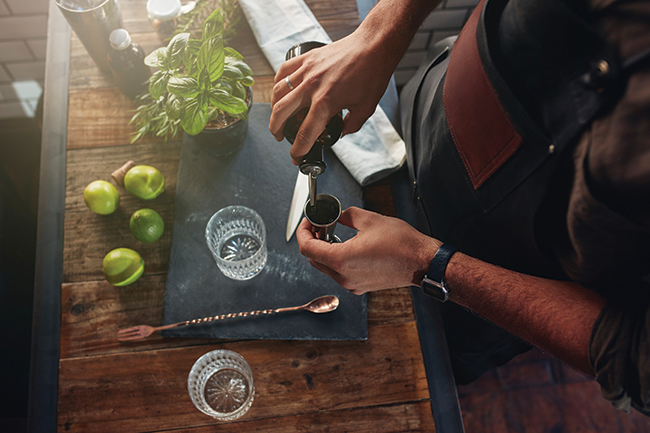Rebecca Field shows us that we can all still enjoy a drink or two, without having to worry about grains and gluten…

Summer is well and truly upon us; and that means we need to be taking advantage of every moment we can to have a get-together in the garden with family and friends. This blissful period of warmer, lazy days and lighter nights make the perfect combination for eating and drinking outdoors. There is something undeniably British about enjoying a relaxing drink in the sunshine, but this can throw up some obstacles for those who follow a gluten-free lifestyle.
Whenever I consider gluten-free options I also like to include information about grain-free. To me, this is needed to provide a complete picture, as gluten and grains are very closely connected. For anyone who suffers from an auto-immune disease (this includes people who suffer from type 1 diabetes, coeliac disease and psoriasis to name a just a few), grains, even gluten-free ones, can cause issues.
Let’s take a look at some of the most popular alcoholic drinks to see where they fit into a gluten- and grain-free lifestyle:
Wine & Champagne
Let’s start with the good news. Wine is absolutely fine to consume when following a gluten- and/or a grain-free diet; the same goes for Champagne.
If you are looking to choose between red and white; red wine contains more antioxidant compounds, along with more minerals and less natural sugar than its white counterpart. You could also look for organic wine which has a lower sulphur content, which can contribute to less severe hangovers!
Fortified wine, such as sherry and port, are also fine to consume; as is brandy and cognac, which is a distilled version of fortified wine. Make sure you check any labels for flavoured brandy as this could contain gluten and/or grains.

Beer/lager/ale/stout
Made primarily from hops, wheat or barley, this is definitely off the list when it comes to gluten- and grain-free drinking. Although the fermentation process will reduce the amount of gluten, it is still going to be present in the final product.
You can get some gluten-free options when it comes to beer/lager, but you would need to make sure you looked into what was used as an alternative (usually oats). If you are sensitive to grains as a whole, you are most likely still going to experience some issues.
If you do want to try some gluten-free beer, you might need to experiment. Luckily, there are several options available so you should hopefully be able to find one that suits you.
Cider
Cider is a fermented drink usually made from apple or pears and, on the whole, should be gluten- and grain-free. There are various methods for making cider, so you should always double check the ingredients for each individual brand.
If you are looking to reduce your sugar intake, then try to stick to dry cider options.

Tequila
Made from a fleshy plant part as opposed to grain; tequila is actually a great option for gluten- and grain-free drinking choices. But it also has a fairly distinctive flavour that not everyone can get along with, so then you need to look further afield at other options for spirits.
If you require a spirit which has not been in contact with any grains this could be the perfect drink for you; perhaps most palatable when incorporated as part of a cocktail.
Rum, gin, vodka & whiskey
Next down the list are the spirits that are made from other ingredients; primarily from grains. The good news here is that although the base ingredients may be gluten- or grain-based, the distilling process removes all of the protein particles that can do you damage. The general consensus is therefore that these spirits are suitable for anyone following a gluten- or grain-free diet.
It is, however, always best to look into the particular brand you want to use in a bit more detail. While the distilling process should not cause any issues, additional ingredients can be introduced during the manufacturing process that need to be avoided. This can result in some people having a reaction to different brands; it all depends on what has been added and how it has been produced. I would suggest avoiding any brands that use flavourings and to contact the manufacturer of your favourite brand(s) to get confirmation that they are gluten- and/or grain-free.
With spirits such as vodka, there are also non-grain alternatives such as potato or fruit-based vodka that could be used if you are concerned about any cross contamination.
As no summer drinks would be complete without it; you will also be pleased to know that Pimms is gluten-and grain-free.

Some mixology!
You can have really great fun with creating gluten- and grain-free cocktails. While soft drinks are gluten- and grain-free, you can try and keep the nutrient content up (as much as it can be when drinking) by using some freshly squeezed juice. You can also try topping up with soda or sparkling water to add a bit of fizz and keep the sugar content a bit lower.
Cucumber juice makes a lovely refreshing mixer for vodka; add ice cubes and fresh mint for a really refreshing and soothing drink. In terms of getting a good boost of nutrients, it does not come much better than a freshly squeezed Bloody Mary.
Don’t forget coffee; it’s an excellent mixer for cocktails, hot or cold. You can also add an extra dimension to your drinks with some herbs and spices. They make an excellent addition for creating some really interesting gluten-and grain-free cocktails. Fresh mint, basil, lemongrass as a swizzle stick, even coriander all work well.
As much fun as it is to make lots of different cocktails, try to avoid mixing your drinks. Remember that alternating with a glass of water between drinks will keep you hydrated and help to make sure that you don’t feel too worse for wear this summer!
 Best known for her books Introduction to Paleo and Amazon #1 Best Seller Paleo: 12 Weeks to Change Your Life, Rebecca is an author and blogger specialising in the paleo lifestyle. Rebecca began her career as a commercial lawyer and after 8 years in the city decided to follow her true passion – food and paleo. Through her website, Paleo Diet and Fitness, Rebecca focuses on all things paleo, from the basics to incorporating paleo within a long-term healthy lifestyle. www.paleodietandfitness.co.uk
Best known for her books Introduction to Paleo and Amazon #1 Best Seller Paleo: 12 Weeks to Change Your Life, Rebecca is an author and blogger specialising in the paleo lifestyle. Rebecca began her career as a commercial lawyer and after 8 years in the city decided to follow her true passion – food and paleo. Through her website, Paleo Diet and Fitness, Rebecca focuses on all things paleo, from the basics to incorporating paleo within a long-term healthy lifestyle. www.paleodietandfitness.co.uk
